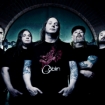Deep in contemplation, At the Gates vocalist Tomas Lindberg pauses from talking about the albums that had the greatest impact on his life and comes to a realization. "When I think about or listen to these records, I go back mentally to a certain time in my life," he reveals. "I'm in my room at my parent's home. I'm listening to this music and I'm in my own world. I get the feeling of being that kid. It's a magical thing."
Lately, the singer's been preoccupied with press and preparations surrounding the release of his Gothenburg band's forthcoming seventh full-length, the brutal, hooky To Drink From the Night Itself. But today, speaking with Revolver, Lindberg's all about lists … and he loves lists.
He can throw together a list of the best singers, his favorite movies, the best thrash metal albums — no problem. However, he has found that narrowing down a list of albums that impacted his life to just ten is extremely difficult and it's something he takes with sobering seriousness. Not only does he consider the albums he plays the most, he judges how much of an effect they had in his listening habits and, in some cases, how they've helped him deal with the world.
"It's very hard to think of this," he says. "I had to leave out some of my favorite records because they maybe weren't as important in affecting my life. So, I focused on one record per genre that I love. And then I realized I didn't put in any jazz records, Krautrock or funk or soul records in there, which are also a big part of what I listen to."
Even without including Can, Faust, Parliament/Funkadelic or anything Motown, Lindberg has assembled an admirable and eclectic list that would be a great starter kit for anyone interested in discovering the history and depth of heavy and artistic music. In addition to metal staples like Judas Priest and Metallica, Lindberg has thrown in seminal albums by the Stooges, Swans and Sonic Youth and dipped completely outside the loud rock galaxy, by including releases by David Bowie and Joy Division.
"This all might explain why I'm so strange," Lindberg says of his list, and then laughs. "It was part of my childhood and was in my DNA already when I was a kid. I listen to these records still, and even now, years later, when people hear me playing some of this stuff they're like, 'Yeah, Tomas is into some weird stuff.' I like that and I think these records from my list explain in many ways why I like the kind of things I listen to today."
Judas Priest 'Stained Class' (1978)
This sums up what heavy metal is to me. In the early Eighties in Sweden, heavy metal was the biggest thing. Half the kids in school were metalheads. You could see Iron Maiden patches and Accept shirts everywhere you went. So Judas Priest wasn't the first metal band I heard, of course. That would be Kiss, which I got into when I was seven. But Stained Class is my ultimate classic heavy metal album, which is why there won't be any Iron Maiden, Black Sabbath, Accept or other classic metal records on my list. I got Stained Class on tape from my cousin when I was nine or ten. He'd send me tapes in the mail and they'd be, like a C90, with an album on each side. It was perfect because most albums were under 45 minutes long. I hated it when a band did a longer record and you had to flip the tape to hear the last song or two. Judas Priest is my favorite heavy metal band and Stained Class is the logical bridge between the early Priest, which I'm actually more into, and the Priest with all the hits, like British Steel and Screaming for Vengeance.
That's all really good, too, but in a different way. I liked Judas Priest when they were more progressive and had a really intricate, weird way of playing rock with a little blues touch that still had an edge. But Stained Class is the ultimate record because it mixes the broad styles of Sad Wings of Destiny with a really full, crunchy production. And it has those more intricate guitar lines, which they lost a little bit on the more popular records. It's a perfect mix of both. My side project the Lurking Fear actually stole the drum intro from "Exciter" for our track "Winged Death." It's more of an homage than a theft. To me, Stained Class never gets old. It makes everyone crazy as soon as they hear it. Whereas some of the hits that came later, it's kind of like, Yeah I've heard it before 10,000 times. I know the song too well to even get excited by it.
Metallica 'Master of Puppets' (1986)
You can argue that Ride the Lightning is as good, or that Kill 'Em All has an edgier vibe, but Master of Puppets was really more important to me. It came out when I was 14 and it was the first Metallica record I owned. I bought it on the day it came out and all my friends did the same. It came out right before the summer and everyone had a ghetto blaster. We were so young that we barely could drink beer, but we'd hang out in parks in the summer and drink whatever we could get. Master of Puppets fit perfectly on each side of a C60 cassette. You didn't have to fast forward much at the end to play the other side, so everybody had that tape with them all the time and we all learned it note for note. Metallica's records before sound maybe angrier, but Master still has the urgency and they started to get into songwriting more. It was a defining record for sure.
For the At the Gates [1995] record Slaughter of the Soul, we really went back to Master of Puppets and tried to figure the formula that made that great. So "Blinded by Fear" is our "Battery" and the title track is our "Master of Puppets." I think a lot of bands probably copied that album without even thinking about it. I could argue that Dark Angel's Darkness Descends is a better record than Master of Puppets. I listen to it more frequently and it's closer to the style I like now. But when Master of Puppets came out it was the only album that mattered.
Possessed 'Seven Churches' (1985)
People argue about whether this record is death metal or thrash metal. I guess it's a little bit of both. But to me, it's a symbol or everything that came after. It's hard to choose between Mental Funeral by Autopsy or Horrified by Repulsion, so the solution is to have Possessed, which was the first record for me that had the whole overt Satanic thing and twisted madness on the crunching guitars and insane vocals. And it still holds up to all other death-metal records. It's audible, it's got a great sense of articulation, but it's still so raw.
I discovered it in the thrash era about one-half year before I discovered other death metal. Back then, that seemed like a long time. I was searching for the heaviest thrash record ever. And during that same time period, I discovered Bathory, Venom and Hellhammer, but Seven Churches is all that stuff in one. There are a lot of death-metal records that are probably as good, but no one can beat it. Nothing is better than it.
Joy Division 'Closer' (1980)
It sums up the whole English rock experience for me. I have a sister whose boyfriend had an amazing record collection with a lot of depth in it — everything from proto-metal like Wishbone Ash, Blue Öyster Cult, Mahogany Rush — and he had pre-punk stuff like the MC5 and the Stooges and new wave, too. So his record collection was a goldmine. Everything I listened to swept me away because I was so young and I hadn't heard anything that honest before. I saw Joy Division's Closer and played it and it really touched me because it was so full-on emotional. When I heard that first song, "Atrocity Exhibition," I was like, "What is this? What are they doing?" I had never heard anything like that before. They were so naked and it went straight to the heart.
When I think about that record I also think of Bauhaus and the really early Human League, Echo & the Bunnymen, Psychedelic Furs, the Fall. All of that stuff came from this album for me. I don't know if I would ever have become a big Jesus and Mary Chain fan later on if I had never been introduced to Joy Division. A lot of people tap into the depression elements of Joy Division, but at the age I discovered it, I think I was too young to have even teenage angst. So it was just the honesty and urgency of the music that attracted me. It just has this authenticity about it. Even though I didn't really know what depression was at the time, I could tell it was such an emotional album.
Sonic Youth 'Sister' (1987)
I have listened to this record practically more than any other in my life. I think this was on Blast First, but their earlier stuff was on SST and I discovered them through that whole scene because I was a big Black Flag fan. We always checked out everything on a label to see if there was something else as good. That's how I discovered Minutemen and, of course, Saint Vitus. The first Sonic Youth record I heard was Bad Moon Rising and that could have been on the list instead. But for me, Sister is just more complete. Every song is good.
A lot of the later Sonic Youth stuff had so much instrumental stuff as well as good songs. Sister has no filler. You could argue that Daydream Nation is maybe even fuller sounding. But Sister means more to me, personally. It was an artistic record with a great pop side. In a weird way, it's almost like a feel-good record. When you're in an emotional mood, sometimes you have to put on something you know you love. This is that record for me.
Swans 'Cop' (1984)
Swans are my favorite band of all bands, mostly because they have such a wide range. If you say you like Swans you have to say what record because they have so much different stuff. Cop is a really direct album that doesn't let go. It's a totally nihilistic slab of noise and it's super-heavy. I picked it up when I was about 16 when I was rummaging through a local record store here called Pet Sounds. They were the biggest store for hardcore punk and some death metal stuff, but they were also big on underground music. They had all the independent albums when being an independent still meant something.
I had heard of Swans so I was very curious and the aesthetic of those record covers was so appealing. I already loved thrash and hardcore, but this was more brutal than anything I had ever heard before. I was immediately blown away. Years later, a friend of mine who hadn't yet discovered Swans, said, "OK, well Tomas loves it so much, I need to get an introduction to the band." So he asked me, "What should I listen to first?"
I wrote him an email and I think it was one of the longest emails I've ever written. I explained about the first period of the band and the first three albums. I wrote about every era and I think I described the band in five different time periods. And I wrote about how he should approach each different period and which album he should listen to first for each one. Basically, don't get me started on Swans unless you want to have a long conversation. It's pure art and it hurts when you hear it, no matter what period you're talking about.
Rudimentary Peni 'Death Church' (1983)
A lot of early hardcore bands mean a lot to me. I was wondering if I should list the first Discharge record, but Death Church had something that continued to affect what I do today – a more arty way of expressing themselves. They were avant-garde and poetic and I loved their weird, angular playing style. It symbolizes that whole U.K. anarcho-punk movement for me. I discovered Death Church in '85 or '86. I had bought some records in a record store and someone in the store picked it up and said, "Do you know this? It's on the same record label." If you were curious, you'd learn a lot that way. It was like being an anthropologist. This album is not on Crass Records, but [Rudimentary Peni] released stuff on Crass before and I liked that label, so there was a logical progression of finding them.
King Crimson 'In the Court of the Crimson King' (1969)
There are so many prog bands, but King Crimson are so artistic, no one can ever compete with them. This is not my favorite King Crimson record. I prefer Red. But In the Court of the Crimson King is the first one that grabbed me — the madness of it. It's so beautiful in some parts and then it's completely manic. You have the car-chasing scene and rhythmical weird parts. It's just an amazing record and it has so much of everything. I was 12 when I heard it from my sister's boyfriend's collection. My first impression was, "What the hell? Can music sound like this?" When we formed At the Gates we all thought of King Crimson as a band we wanted to be like — not in sound at all, but in approach — something you couldn't touch. You never knew where they were going and they could be anything they wanted because they were King Crimson.
The Stooges 'Raw Power' (1973)
MC5 must be the biggest band from the proto-punk and garage-rock era, and might seem like the most essential band, but they never released that album. The Stooges did when they put out Raw Power. I also discovered this from my sister's boyfriend's collection and when I saw the cover I thought, "What the Hell?" It was so dirty and mean. And except for "Penetration," it's more full-on than the band's other albums. Raw Power is like a monument. You can't really argue with it. Though I think now I like Funhouse a bit better because it's more experimental.
David Bowie 'Scary Monsters (And Super Creeps)' (1980)
I was eight when this record came out. My sisters were huge Bowie fans so I know the whole Bowie catalog by heart. He's my all-time favorite singer. He has soul, so much character and he's a real artist. There's no stealing or careerism to him. He could do anything and he did over and over. Scary Monsters is my favorite because it's actually the weirdest one, but it still has pop sensibility. I listened to that when I was a kid and I liked it, then I listened back to it many years later and I thought, "This is a really fucked-up record. How can this be so catchy at the same time?"
It's ugly and mean, but still beautiful. I didn't know at the time I first heard it that Robert Fripp played the guitar solos on some of the songs and the way they got it together was so wild. Bowie and Fripp would apparently throw darts at the board to determine what notes to play on the solo. When I heard that I was like, "Wow, this is crazy. Now I understand why this record is so great."












